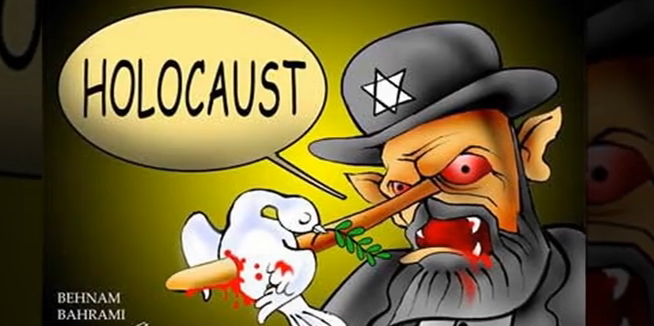UNESCO Director General Irina Bokova sent a letter of complaint to Iranian officials over the country’s upcoming Holocaust cartoon contest, The Jerusalem Post reported on Wednesday.
The contest will be held as part of the 11th Tehran International Cartoon Biennial, which is sponsored by the Tehran municipality. Organizers are expecting to draw entries from over 50 countries and offering a top prize of $50,000 for the best cartoon mocking the Holocaust.
Bokova’s complaint followed a request by Israel’s ambassador to UNESCO, Carmel Shama-Hacohen, to condemn the contest. A UNESCO representative said the event is “completely opposed to the spirit of UNESCO and to actual programs and publications that UNESCO has been putting out for decades.” The representative added that combating racism and hate speech have been UNESCO’s priorities from the time of its founding.
UNESCO is scheduled to commemorate International Holocaust Memorial Day on Wednesday by focusing on “the roots and consequences of hate speech.” According to the Post, Iranian President Hassan Rouhani is set to address UNESCO’s staff that day.
The cartoon contest, which will take place in June, follows a similar event held in 2015 that featured hundreds of submissions of anti-Semitic art. Organizers claim that the contest is meant to expose “the West’s double standard behavior towards freedom of expression as it allows sacrilege of Islamic sanctities… but prevents research on the Holocaust due to the Zionist regime’s steadfast opposition.”
Though presented as a challenge to the West’s commitment to free speech, the contest is coming at a time when Iran is increasingly cracking down on free expression. Two Iranian poets were sentenced to lashes and jail time in October for shaking hands with members of the opposite sex, and the country was criticized in November by Ahmed Shaheed, the United Nations official in charge of monitoring human rights in Iran, after five journalists were arrested. Iran “should not silence critical or dissenting voices under the guise of vague and unsubstantiated national security concerns,” Shaheed said.
Rouhani was asked about the Holocaust in a September 2013 interview with CNN. Though CNN and other outlets hailed Rouhani for breaking with his Holocaust-denying predecessor Mahmoud Ahmadinejad and condemning the genocide, an independent translation of the interview by the Wall Street Journal showed that CNN had mistranslated his remarks.
Iran’s supreme leader, Ayatollah Ali Khamenei, denied the Holocaust in a public address in 2014, saying that “the Holocaust is an event whose reality is uncertain and, if it happened, it’s uncertain how it happened.”
Emanuele Ottolenghi, a senior fellow at the Foundation for Defense of Democracies, wrote last year:
Given how entrenched and pervasive Holocaust denial and anti-Semitism are within the Iranian regime, it is hard to dismiss the possibility that the regime’s principal motivation for embracing this narrative is to provide justification for its recurrence. Holocaust deniers, after all, have long sought to excuse the crime’s perpetrators and shift guilt onto its victims as a prelude to repeating that same crime.
[Photo: ISCAorg CH / YouTube ]




